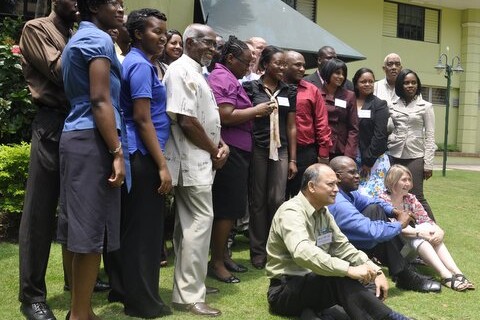We are pleased to announce our upcoming Investigative Journalism workshop in Jamaica, in partnership with UNESCO. The following press release is available for all media outlets.
WHAT: The workshop will aim to enhance the capacity of Caribbean journalists to function as effective investigative journalists in the digital age through a sustained training course and via network building.
This project will promote the role of the media as a platform for democratic discourse through professional capacity building and supporting media institutions. Caribbean investigative journalists will also benefit from the support and experience of international colleagues working in the same field. The workshop will run for three-days and the curriculum will include: freedom of information, investigating the environment, information security, interview skills, and personal security.
The lead workshop facilitator is Professor Brant Houston. Prof. Houston holds the John S. and James L. Knight Foundation Chair in Investigative and Enterprise Reporting at the University of Illinois. He will be assisted by Steffon Campbell a Lecturer in Communication Culture and Caribbean Society.
WHY: The role that media can play as a watchdog is indispensable for democracy. This point is clearly made in The UNESCO Global Investigative Journalism Casebook. According to the 2013 Transparency International survey, Caribbean countries including Guyana, Suriname, Trinidad & Tobago and Jamaica all had Corruption Perception Index scores less than the global average.
It is investigative, critical and thorough journalism, which often helps to reveal corruption. Investigative journalism can be expensive in comparison to the cost of other forms of broadcast news provision, principally because it is often labour intensive and carries a significant amount of legal risk. This form of journalism goes further than conventional news reporting to shine light on social plights, influence public policy and trigger change. Investigative journalism is a cornerstone in our work to improve the professional skills of journalists and enable media to act as a watchdog over the actions of governments and vested-interest groups this play a crucial role in promoting good governance, accountability and transparency.
The advent of new technologies and the increasing take-up of social media have also had a significant impact on the field of investigative journalism. Social media offers journalists new ways of contacting sources and accessing information from around the globe and it offers different contexts and different ways to present information to a larger audience as well as numerous resources but how can we use digital media effectively and how accurate is it?
WHERE & WHEN: The workshop will be opened by Dr Marcia Forbes and the Director of UNESCO Jamaica
Date: Monday 29th Feb – Wednesday 2nd March 2016. Location : Creative Production and Training Centre, (CPTC) Kingston, Jamaica
For Media Enquires please contact: Jasmine Chandler, jas@publicmediaallaince.org Tel: +44 1428 605193
Supported by
Related Posts
28th January 2016
Investigative Journalism in a Digital Age
30th October 2015
Our upcoming Jamaica workshop
2nd August 2013


